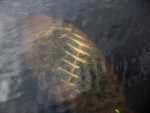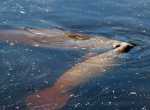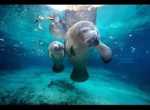Cold weather is bad news for Florida manatees

On the Road series
The cold wave which is bringing icy temperatures to over half the nation is having a correspondingly chilly effect in southern Florida, as residents prepare for thirty-degree mornings. Missouri visitors to the normally balmy peninsula are unpacking the warm clothes they came in.
Under the normally-warm Florida waters, a unique resident swims unnoticed most of the year. However, things change when temperatures dip. The gentle giants known as manatees migrate to the only warm water available, namely, the discharge from local power plants.

According to Kevin Baxter, media relations officer for the Florida Fish and Wild Life Institute in St. Petersburg, manatees need temperatures above 68 degrees.
A record number of manatees--803--were killed in 2013. Especially alarming is that 126 calves have been lost.
Though most manatee deaths are due to contact with boat motors or cold weather, 111 manatees, along with 67 dolphins, were killed in 2013 by a toxic red algae bloom (Red Tide) on the Indian River, where 47,000 acres of sea grass were destroyed by the algae bloom.

Reasons for the deaths have been blamed on a number of difficult issues. Excessive rainfall has caused the U.S. Corps of Engineers to release water from Lake Okeechobee into the canals. This water carries silt and other solids that make the water murky. The water also carries high levels of nitrogen and phosphorus pollutants.
Additionally, pollutants are released by the 237,000 septic tanks in the three counties near the lagoon.
The manatees may also be a victim of Florida's crop production, as the runoff from fertilizers pollutes their food source and is thought to contribute to the Red Tide.

Gov. Rick Scott (R) rejected funding to research the mass animal deaths at the Indian River Lagoon.
In Ft. Myers, Manatee Park has been set up as a manatee viewing station, where curious visitors can stand above the canal leading from the huge Ft. Myers Power Plant to the Caloosahatchee River, where manatees come in from the Gulf of Mexico. Last week, conservation officials counted almost 300 of the large aquatic "sea cows" in the confines of the station waters.
The Florida Fish and Wildlife Conservation Commission has set up an information center and park at the viewing station, where they charge a dollar per car to park and view these fascinating creatures. The money is used to protect the manatees as a unique resource for the state. The state also sells a special "Protect the Manatee" license plate. Funds from the sale of the plates go directly to manatee research and protection.
The Florida manatee lives in brackish, salt and freshwater coastal areas around Florida, except when cold temperatures force it to the power plants. An adult manatee weighs around 1,000 pounds and is about 10 feet long.
At birth, calves weigh about 60-80 pounds. The cows produce one calf every two to three years, so the reproduction rate is slow. Calves stay with their mothers two or three years.
The manatee is a plant-eating mammal (herbivore) that must come to the surface to breathe air every three to five minutes. Like all mammals, it has hair on its body, nurses its young and is warm-blooded. Manatees can live to be about 50 to 60 years old, if they don't get killed by careless boaters.
Recently, Florida residents learned that a dead manatee cow was found in the straits between Pine Island and the Florida mainland. The area is known as a favorite locale for manatees. Signs are clearly posted, urging boaters to slow their boats to 35 mph or less, so that the slow-moving animals have time to get out of the way. Many manatees display scars from their encounters with boat propellers.
The Florida Conservation Commission has a toll-free number for residents to report deaths, injuries, harassment, accidents or orphaned manatees.
Rules for human interaction with manatees are specific. It is illegal to do the following: Give food to the manatees (this causes them to lose their fear of humans, who could feed them harmful things), give them water to attract them, separate a cow from her calf, disturb mating herds, pursue or chase them, block their path if they move toward you, hunt or kill manatees, fish or attempt to hook them. In all cases, "passive observation" is encouraged.
Fishermen are also urged to recycle monofilament fishing line, so that marine life will not become entangled in it. They are encouraged to wear polarized sunglasses while operating a boat, so they can better see objects beneath the surface.
As the warmer weather comes to southern Florida later this week, these unique tropical animals will swim back out to the Gulf of Mexico to continue their quiet, peaceful grazing on sea grasses. Mama manatees will nurture their young in the warm waters of the Gulf, oblivious to the curious stares of tourists.
